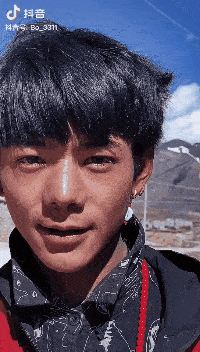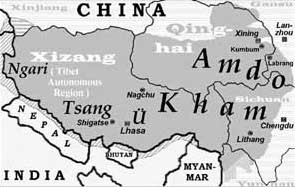
November 2020, a Khams pa boy named Dingzhen becomes famous for his good look. It starts from a short video of him and the following trend #how handsome can khams pa men be#. (Khams pa is the people living in Kham)

At first, people are impressed by Dingzhen’s innocent smile and ‘tameless’ temperament. His fans praised his appearance, shared his photos, but they strongly disagree with him to start his career as an Internet celebrity.
In Dingzhen’s live broadcast, some audiences said modern apparel does not fit him; he looks better in Kham pa’s traditional costume. They thought Dingzhen’s uncle, who translated Dingzhen’s words into Mandarin, was manipulating his nephew by telling him how to interact with the audiences. Rumours are saying a few entertainment companies went to Sichuan to recruit Dingzhen, which annoyed some people. ‘I want to see good-looking men in different styles,’ one of the comments said, ‘I do not want them to be the same and driven by the interest.’
Dingzhen’s living condition is much improved after being famous. Local tourism authority hired him to be the ambassador; his followers donated many books for him and the local schools. The problem is that how should Dingzhen’s life be like after that? Some people believe that the best choice for him is staying ‘original’, being like a ‘Kham pa’ man in their imagination, which means living in undeveloped areas and maintain a traditional lifestyle. They worry that he would be ‘tarnished’ by this ‘materialistic’ modern society thus lose his trueness. Others, however, think we should respect Dingzhen’s freedom of choosing his lifestyle, whether it would be traditional or modern.’ Some netizens headcanon him to be an unworldly people arbitrarily,’ someone commented, ‘and feel disappointed arbitrarily after finding that he is not the one in their imagination.’ A Tibetan complained that ‘people label Tibetans as unsophisticated and hospitable, and they will find fault with us when we do not meet their requirements. We too need keeping pace with the society; we use Alipay and Wechat, we ride motorcycles, we live in concrete houses. I hope our choices of lifestyle are respected.’
The charm of trueness, purity, innocence, savagery and mysteriousness in Dingzhen is from the stereotype of Kham pa constructed in the head of Han Chinese. Like the core ethnic groups in most of the countries do to others, Han Chinese thrust their imagination of the ‘uncivilised’ people upon Kham pa, Tibetan and other minorities. As the members of the present world ‘dominant’ culture, western people always have the aesthetic judgement that ‘the expansion of civilisation is necessarily destructive of nature and cultural diversity’ (Theodossopoulos, 2012). The introduction of Western culture is considered to be on the contrary to an imagined authentic or natural set of cultural practices (ibid.). This assumption is always associated with the act of romanticising and mystifying unfamiliar foreign cultures, which is called exoticization. Thus Western tourists like Emberá dressing attention-grabbing traditional attire which have been abandoned before the tourism developed (ibid.); American audiences like Anna May Wong to act stereotyped characters, which fit the imagination of Asian women: a childish doll (Staszak, 2015). The relationship of exoticisation often includes inequality: some people have the right (or think they have the right) to judge and interfere, not only because they are the major ethnic group in this country but also because they are economically and culturally privileged. By saying ‘culturally privilege, I do not mean their culture is better than others’. The point is they have more opportunities and measures to express themselves, spread their culture and thus become more influential.
What the Internet and ICT does is deepening this inequality by providing opportunities to minorities to commercialise their culture. It is true that the Internet can make grass-root people famous, but who can stay and who will be forgotten soon? What measures will these grass-root celebrities take to keep their fame? From the moment when they decide to make a living by being an internet celebrity, they are more or less commercialised to a cultural product. Comparing with movie or TV show, the Internet makes the interaction between the performers and the audiences more instant, and the comments from the audiences and followers can easily reach to the celerity. Dingzhen puts back on his traditional attire catering to the aesthetic need of the audiences. The stereotype and the exoticisation are reproduced.
This post does not aim to answer what shall Dingzhen do or what shall he wear. It is his life, his decision. What we can do is to rethink our standpoint and any possible tendency of exoticisation in our mind before judging in the comment.
References:

